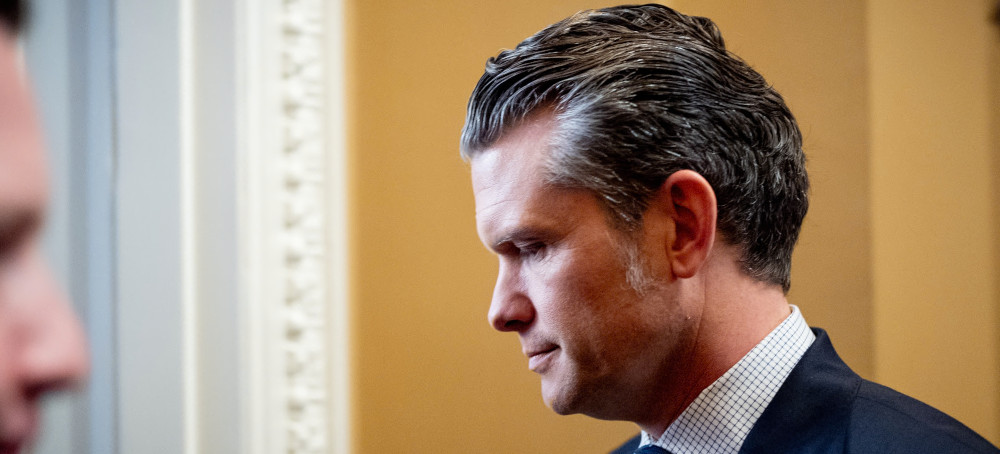Trump Pick a Threat to US Military’s Counter-Extremism Effort, Experts Warn
Ben Makuch Guardian UK Pete Hegseth arrives for a meeting at the Capitol earlier this week. (photo: Getty)
Pete Hegseth arrives for a meeting at the Capitol earlier this week. (photo: Getty) Trump Pick a Threat to US Military’s Counter-Extremism Effort, Experts Warn
Ben Makuch Guardian UK
Critics fear ‘absolute disaster’ and say Pete Hegseth’s far-right views will hinder attempts to tackle serious problem
“I think it’s going to be an absolute disaster,” said Kristofer Goldsmith, an Iraq war veteran and the CEO of nonprofit watchdog Task Force Butler. “Pete Hegseth is a domestic extremist.”
One of president Joe Biden’s earliest policy initiatives was tackling extremism among government workers, including soldiers in the military.
Fresh off January 6, when scores of active duty or former US servicemen were caught participating in trying to overthrow the Capitol, current secretary of defense Loyd Austin issued a historic “stand-down order” in February 2021, demanding all servicemen in every branch of the military reflect on the issue of extremism.
Not long after that, the DoD rolled out expanded guidelines, a broad definition of extremism and extremist activities while in uniform, policing of soldiers’ social media accounts and new recruitment requirements. But Republicans, clearly sensing a campaign issue, began attacking the Pentagon’s working group and criticizing its counter-extremism activities as a recruitment killer.
“They gave it a good start, but the lack of backing for many efforts, and the failure to support the extremism working group left the effort rather bereft,” said Heidi Beirich, the co-founder of the Global Project Against Hate and Extremism (GPAHE). “Just as the insurrection was downplayed by Republicans, so too has extremism in the military.”
Though the Biden administration made some of the first real attempts at addressing the issue, it didn’t go far enough, says Beirich, particularly as Trump is set to take back control of the government in January and will decide if any of those initiatives live on.
“Also a new screening database for tattoos was created, some tightening up of clearances, and some more investigative clarity, but a more fulsome effort should have been on the table,” she said. “Of course, Republicans are far more to blame as they politicized the whole process, made light of the problem and claimed efforts to root out extremists were giving the military a bad name.”
As for Hegseth, there has been public speculation about some of his tattoos of crosses and medieval imagery and whether they would disqualify him from recruitment today.
Hegseth, an Iraq and Afghan war veteran, was barred from attending Joe Biden’s 2021 inauguration after a fellow national guardsman accused him of being an “insider threat” and an extremist with problematic tattoos.
Goldsmith continued: “I know that there’s been a lot of attention on his crusader tattoos. There hasn’t been enough attention on his actual books. He wrote a book that is titled American Crusade. The guy has tattoos … However, the bigotry and the hatred that he put in black and white, that is more important.”
Hegseth’s 2020 book is replete with conspiracy theories and anti-Muslim rhetoric. His 2024 book, The War on Warriors, he also directly scorns the “woke” American generals pursuing counter extremism policies.
“He’s made it clear he doesn’t care about this issue,” said Beirich. “I think we can assume whatever efforts that are happening are about to end. And that, to me, should be disqualifying for the position.”
The problem with extremism in the American military and its veteran community dates as far back as the civil war. Following the end of the bloodiest conflict in US history, the Ku Klux Klan was founded and headed by Confederate veterans, while hundreds if not thousands joined in its earliest surges of racist violence during Reconstruction. After the world wars, the Klan targeted the recruitment of thousands of veterans, revitalizing their political significance in both eras.
Historians have also well shown that stateside extremism, which includes white nationalism and neo-Nazism, booms after every major US war.
For example, Oklahoma City bomber Timothy McVeigh was a soldier who served in Operation Desert Storm in the Gulf war before he planned his attack with conspirators who were also fellow veterans he had met during his service.
In the contemporary era, neo-Nazis in groups like the Base and the now-disbanded Atomwaffen Division had members who had links to the US military. Both groups specifically sought out veterans and active duty servicemen for their combat and weapons training. Likewise, recent University of Maryland data found that at least 480 people with military service backgrounds were accused of extremist links between 2017 and 2023, which includes 230 people involved in the January 6 attacks.
If successfully nominated, how Hegseth plans to prevent recruits with extremist backgrounds from joining up, has yet to be seen.
Instead, Goldsmith forecasts Hegseth will be settling scores with whoever the former Fox News host sees as his political enemies.
“If and when extremism is addressed by the department of defense under the Trump administration,” said Goldsmith, “I do think that they will take efforts to root out these imaginary communists that I’ve never fucking met in my life, and antifascists like myself.”
Hegseth has long claimed he could easily address the Pentagon’s major recruitment shortfalls in recent years, but still advocates for halting the integration of women and transgender soldiers who are currently serving.
“Trump wants to kick out everyone who’s trans,” said Goldsmith, “I think the number is 15,000, so if you overnight kick out 15,000 active duty troops just because of their gender identity, you’ve got an even bigger shortfall.
“I think they are going to put ideology before national security.”
